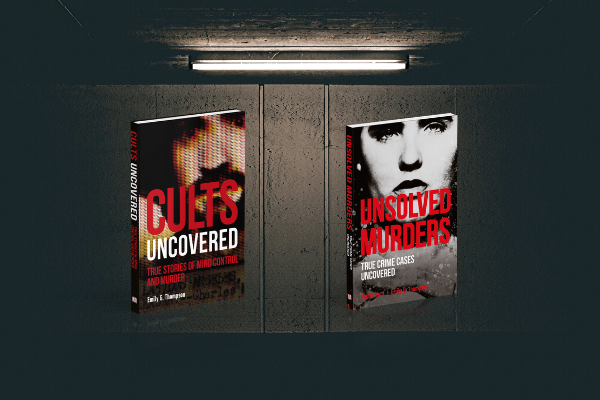Emily G. Thompson Q&A: Cults Uncovered
With an interest to true crime from a very young age Emily G. Thompson, the author of Cults Uncovered and Unsolved Murders, talked to us about all things morbid, the story she found most interesting from her book, and so much more.

As author of both Cults Uncovered and Unsolved Murders, have you noticed any similarities between murderers and cult leaders?
There are significant differences from case to case, but there can be a lot of characteristics that murderers and cult leaders share. The main similarity is an obsessive need to exert power over their victims or followers.
How did you first become interested in true crime and investigative journalism?
I’ve been fascinated with true crime since I was quite young. My mother was a massive true crime book buff, and as a child, I remember she had this giant book case filled with true crime books! As I got older, I used to steal her books and my interest grew from there. Believe it or not, I wasn’t a big fan of writing while in school, but then when I began studying the psychology of criminal profiling, I began to enjoy writing about true crime as much as I enjoyed studying and researching it.

Which story from Cults Uncovered did you find the most interesting?
Each case was fascinating in different ways, but I’ll have to say Jeffrey Lundgren and the Kirtland Cult. The reason I found this the most interesting was specifically because I had never even heard of this case, and I enjoyed delving into something I knew absolutely nothing about. Heaven’s Gate was another one I found fascinating because they left so much behind on the Internet which can still be viewed today. What’s particularly interesting about Heaven’s Gate is that they drew from different aspects of American culture wherein they blended evangelical Christian beliefs and new age science fiction into an organization that gained worldwide notoriety. They were the first cult of its kind that truly believed in UFOs and aliens, and they meshed these beliefs with their religious beliefs, creating a modern age cult.

Why do you think cults find followers when there are so many obvious red flags?
There’s this massive misconception that only naïve, gullible, and kooky fanatics can be lured into a cult, and that’s a stigma that still exists even today. All it takes for someone to be victimized by a cult is for them to fall into a vulnerable state. In this state, people can be influenced much more easily than normal. People are more prone to joining a cult during the most difficult times of their lives, when they’re made vulnerable by certain situations or personality traits. When you’re looking for a deeper meaning to life, searching for answers, or seeking a sense of purpose, you may be so blinded by a cult leader’s charisma and power that you'll miss or choose to ignore red flags. By the time people realize they’re in a cult, it’s already far too late: they’re isolated from all of their loved ones and have become dependent on the cult.
Any thoughts on why we often find morbid subjects so compelling to read about?
True crime stories manage to captivate the public so much because they involve all of the most emotional subjects—violence, sex, greed, power, obsession, and death. These subjects are tantalizing, and they can be very hard to look away from. They allow us to take a look into a world that hopefully none of us will ever experience first-hand; it’s so outside the realms of our own safe lives that we cannot help but be gripped.
When it comes to true crime, the feeling of gratification may be intensified at the end of the story, but then if it’s an unsolved case, it creates a global game of “whodunit.” We like to feel as though we are a part of something and especially with social media, we can analyze the evidence put before us and become armchair detectives, throwing around personal theories and suspects.

Given that all the stories in Cults Uncovered and Unsolved Murders are true, what was the most challenging part about writing them?
There’s a moral responsibility when it comes to journalism, especially true crime journalism. There is a thin line between reporting and sensationalism, and making sure I don’t cross that line is always something I’m conscious of when it comes to writing books, articles, and podcasts. It’s very important when telling someone else’s story that you get that balance right and give justice to the victims.
Do you think that cult leaders truly believe in what they are espousing or are they simply trying to court power and fame?
It differs from cult leader to cult leader but in one way or another, they’re all pathologically narcissistic and in their minds, they’re convinced that it’s the rest of the world that has a problem, not them. They all have an over-abundant belief that they themselves are special and the chosen ones, and therefore they should be revered by others and should be more privileged.

Are there any warning signs in people that you've learned to be on the lookout for after writing these two titles?
Within hours of a tragedy, people are always asking: How did this happen? How did we miss the signs? However, the problem with preventing tragedies is that we can’t read people’s minds and quite often, there can be little to no warning signs. When it comes to warning signs, each case and each perpetrator or victim is truly unique and it’s up to those closest to them to be able to see the signs. For example, is somebody who is usually outgoing becoming withdrawn and sullen? Is somebody becoming hyper-religious or a liar? Has somebody changed their conversational style and begun using words that evidently aren’t their own?
Does your work ever give you nightmares?
I wouldn’t say that it gives me nightmares per se, but there have been nights where I cannot get something I have been researching out of my head. I think when it comes to true crime journalism, you need to be able to detach yourself emotionally on the one hand while on the other, you need to empathize with whom you are writing about. When the subject is something as heinous as murder, it can and does impact me, but I think it’s extremely important to be able to partially desensitize yourself while still remaining as compassionate as possible.

About Emily G. Thompson
She is an investigative reporter and true crime author from Northern Ireland. She is the founder of the website, Morbidology, and the writer, host, and producer of the weekly true crime podcast of the same name.
